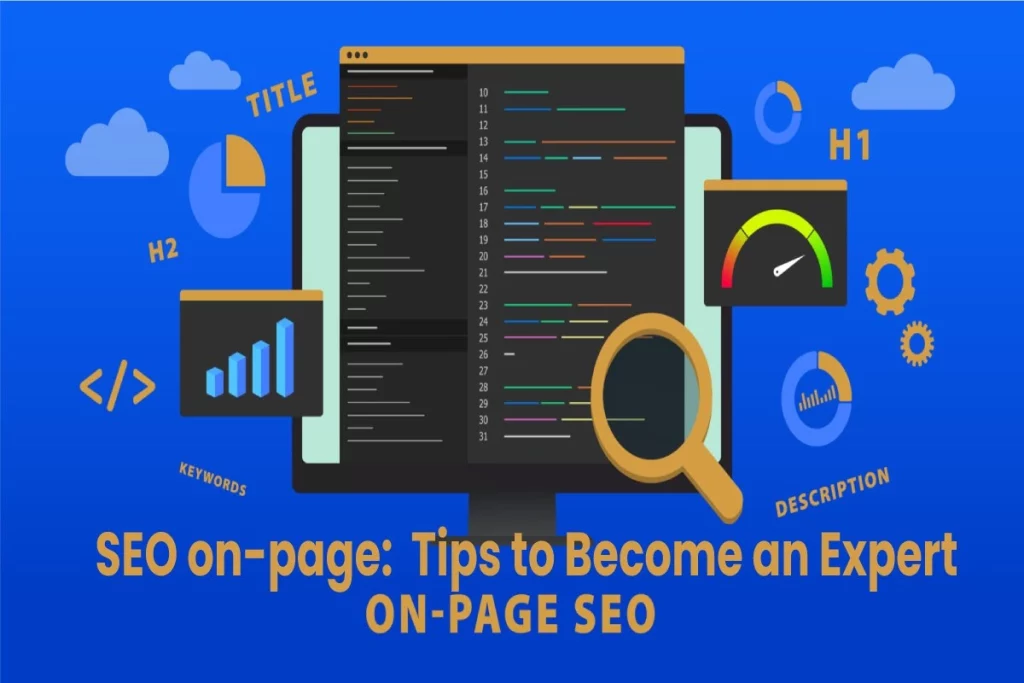As marketers, we must stay ahead of the seemingly endless updates to the Google algorithm. We run the risk of non-appearing in essential keyword searches. SEO on-page
However, keeping up with all these changes is not an easy task. Luckily, when it comes to achieving success with SEO on your website, one rule of thumb continues to be a proven technique: optimizing sites with relevant and targeted keywords.
If you have a well-optimized site, you will start to see results, such as better quality visitors, higher conversion rates, and ultimately, more customers.
This article will discuss how to add keywords to your website once you’ve completed your keyword search.
Do you already have your keywords ready? Perfect. Read on to see what on-page SEO is, in which sections of your website you should add those keywords, and how to avoid search penalties.
Table of Contents
What is on-page SEO?
SEO on-page is the set of techniques to improve the positioning of the pages of your site. It is a discipline that encompasses using keywords, optimizing the user experience and using internal and external links, adding featured snippets and checking that pages are mobile-friendly.
In general, search engine optimization (SEO) includes creating, promoting, and optimizing a website’s content. For its part, SEO on-page refers to the improvements of the information on specific pages of your site that are made to achieve a better ranking in searches.
Of course, on-page SEO isn’t the only thing determining where your site will rank in a search. For this reason, essential to consider and understand the differences between on-page SEO and off-page SEO.
What is the difference between on-page SEO and off-page SEO?
To be brief, we could tell you that:
- On-page SEO is what a site “says to a search engine”.
- Off-page SEO is what “other sites say” about a place.
But what does each refer to? What could the sites say to search engines? On-page SEO (or “what a site says to a search engine”) is about optimizing individual web pages so that search engines:
- Understand the theme and keywords of the pages.
- Match each page with relevant searches.
On-page SEO encompasses the content itself and the HTML source code. Both elements can be optimized for search. To understand it more thoroughly, we will address these two aspects of the structure of on-page SEO later.
On-page SEO refers to external ranking signals that engines receive, such as links from sites outside of yours that include links to pages on your site.
Although certain things can be done to improve off-page SEO, it is an aspect that does not depend solely on you. The opposite is the case with on-page SEO, so improving it can significantly help your inbound marketing efforts by allowing you to attract exemplary visitors to your website.
It would help if you optimized your pages so that search engines understand who you are, what you do and what you write about. Once again, when you improve on-page SEO, you will help improve your website’s organic ranking in search engine results pages (SERPs).
Learn about HubSpot’s on-page SEO tool built into the software itself.
The structure of on-page SEO
As we mentioned before, on-page SEO has two major elements that build its structure, and you must know and identify them to improve your positioning. The first part of the structure is related to the keywords or keywords used in the pages.
On-page SEO optimization related to keywords
Although you might think that these are aspects that only concern those who write content, the truth is that it should be the most critical concern for any content creator, from writing to images and HTML programming. Therefore, to take care of and improve on-page SEO related to keywords, you must take into account the use you make of them in:
- The title of the publication or post
- The name of the URL
- H1 tags. They are often the same ones that give the title to the post, but it is better if you review it.
- first hundred words (or the first paragraph) of the content on your page
- The meta title and meta description tags
- The names of the images, as well as the alt text or alt-text tags to the images
In addition to these aspects, it will be beneficial for you to consider the semantic keywords or semantic keywords. And the topic clusters since they are elements that will help the search engines position your site and content within the turn to which your company is dedicated.
Semantic words are not necessarily secondary keywords but rather words that help better define the topic you are talking about. For their part, topic clusters are mentions of general issues in your content is included. This article, for example, belongs to the SEO topic cluster, but its particular theme is onpage SEO.
On-page SEO optimization is not related to keywords
Now, the second element that makes up onpage SEO is not associated with keywords and is made up of the following components:
- Links or internal links
- Links or external links
- content-length
- media elements
Taking external and internal links into account will allow search engines to place your site within the rankings relevant to the topics. It deals with (along with other aspects of onpage SEO related to keywords and issues). Cluster). For this reason, we will deal with both types of links in detail later. Of course, before doing so, it is worth mentioning that links or external links should not be confused with off-page SEO.
Although both refer to links from external sites to yours, the difference is that onpage SEO external links are the hyperlinks that redirect your readers to external sites. In contrast, off-page SEO external links are hyperlinks. The links that external sites take from pages of your site. Later we will give you advice on this.
